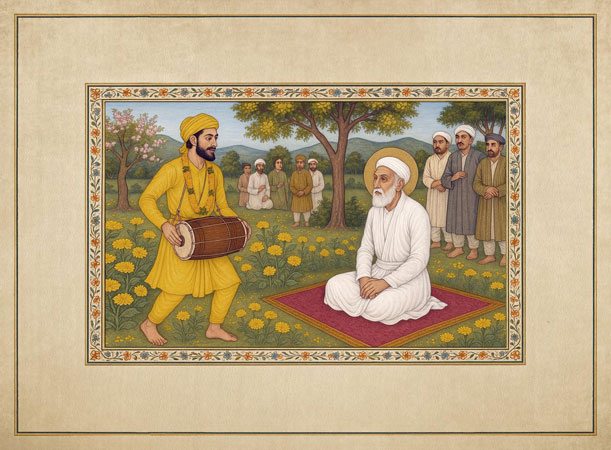
Pakistan, June 26 -- This is the 17th article in a special series by Ally Adnan that brings to life memorable incidents from the rich and fascinating life of Hazrat Amir Khusrau, whose timeless legacy continues to inspire the world.
Hazrat Nizamuddin Auliya shared a profound spiritual bond with his nephew, Maulana Taqiuddin Nooh.
After every namaaz, the young man would ask God to grant years of his own life to his uncle, so that the saint could continue to benefit the world. The prayer was answered and Taqiuddin died young. Nizamuddin Auliya was overcome with grief, not only by the loss but also by the quiet sense that his nephew's life had been shortened to extend his own. He withdrew from public life, spoke very little and gave up food and drink almost entirely. Amir Khusrau, deeply troubled by his master's unrelenting sorrow, tried to console him, but all his efforts to lift Nizamuddin Auliya's spirits failed.
One day, while passing through a village near Delhi, Khusrau saw Hindu women dressed in yellow, singing and carrying mustard flowers on their way to a temple to celebrate the spring festival, Basant Panchami. When he asked where they were going, they said they were on their way to make their gods happy. Khusrau was moved by their devotion and wondered if he could bring happiness to his master in a similar fashion. He changed into yellow garments, adorned himself with a marigold garland, slung a dholak over his shoulder, and walked toward the garden where Nizamuddin Auliya sat with his disciples. As he approached, he began singing a Persian verse by the venerable Fariduddin Attar of Nishapur, a predecessor of Amir Khusrau, composed in Raag Bahar and set to the rare fifteen-beat Taal Pancham Sawari.
I have come weeping, like the cloud of spring
He sang the line repeatedly, entering a state of mystical ecstasy, lost in the cadence of verse. When Nizamuddin Auliya heard his voice, the song resonated within him and brought tears to his eyes. Then, for the first time since his nephew's death, he smiled.
At that moment, Khusrau celebrated the smile of his master by singing the second hemistich of the couplet.
O Cupbearer, come now, and bring the wine
Nizamuddin Auliya rose in a state of spiritual rapture and embraced Khusrau. Music returned to the khanqah as grief gave way to grace.
Basant became part of the Chishti Sufi tradition from that day onward. Centuries later, the saint's followers continue to gather at his dargah in Delhi each spring, wearing yellow, offering mustard flowers, and singing in remembrance of the day when Khusrau's song restored the smile to his master's face.
Post a Comment for "The Sufi Saint's Smile: Amir Khusrau's Life Through Verse and Vignette (International Edition)"